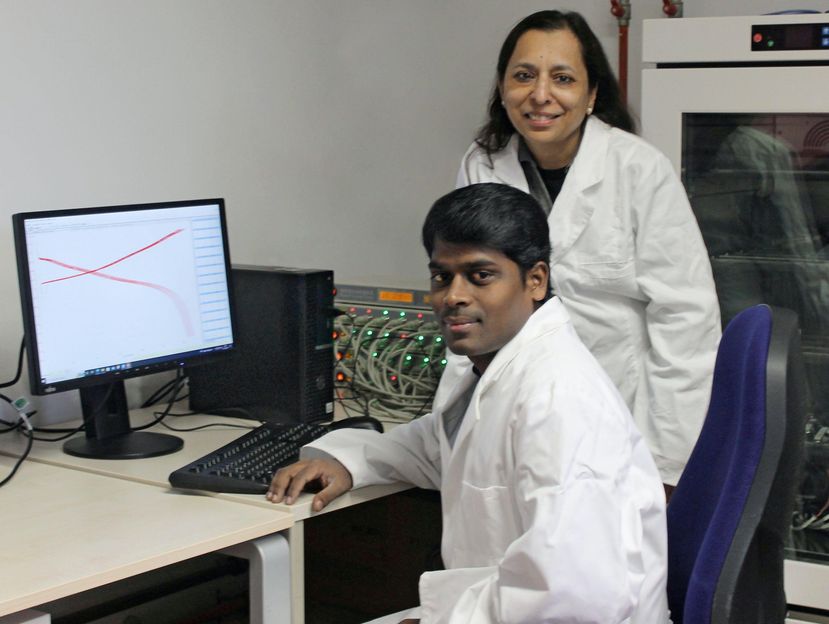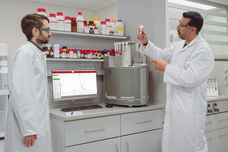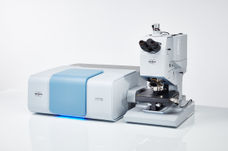Toward high-performance solid-state batteries
Researchers develop ultra-thin solid electrolyte
Operational reliability, durability and high energy density: In these respects, solid-state batteries are superior in principle to conventional liquid electrolyte lithium-ion batteries. Some of the problems standing in the way of widespread industrial application – in the field of electromobility, for example – are the poor interface compatibility between cathode and electrolyte and low ionic conductivity at room temperature. An international team led by Prof. Dr. Seema Agarwal at the University of Bayreuth has now developed a solution to this: a very thin solid electrolyte consisting of a polymer-ceramic composite. The researchers present their important discovery in the journal "Advanced Energy Materials".

Dr. Sivaraj Pazhaniswamy at a facility for battery testing in a Bayreuth laboratory for macromolecular chemistry.
UBT
The solid electrolyte that the researchers developed is a combination of a polymer and ceramic nanofibers. This composite material is applied – very much like a coating – to the porous surface of the cathode. Here, it fills the tiny cavities, forming a solid electrolyte that has stable contact with the cathode. At the same time, it is only about seven micrometres thin. Compared with earlier solid-state batteries, this new system is characterized by the fact that the electrolyte encloses the cathode particles like a shell: This creates a significantly improved interface, which has the added advantage of activating the ions in the cathode. Due to this modification, the new solid electrolyte increases the energy storage capacity of the batteries.
Another major advantage of this ultrathin solid electrolyte interacting with the cathode is that it greatly increases the operational reliability of the batteries. "Conventional lithium-ion batteries that use liquid electrolytes repeatedly cause safety problems. There is always a risk that the electrolyte will leak, causing the battery to short circuit and fail. Cell phones, laptops and electric vehicles have already caught fire because of this, causing serious accidents. An additional problem is the growing of lithium on the anode, the so-called interface dendrites, which pierce the electrolyte and can lead to a short circuit or fire. All these risks are eliminated or at least significantly reduced by our ultra-thin composite solid electrolyte, which has high thermal stability," explains Prof. Dr. Seema Agarwal, Professor of Macromolecular Chemistry at the University of Bayreuth.
The lead author of the new study, Dr. Sivaraj Pazhaniswamy, points to another advantage: "If a thermally stable solid electrolyte is used instead of a flammable liquid electrolyte, it is possible to take full advantage of lithium as an anode material. Compared to other materials used in conventional liquid electrolyte batteries, lithium has highly attractive properties, such as high theoretical capacity and low electrochemical potential. Now that our new solid electrolyte has performed so excellently in its interactions with the cathode, we want to work toward optimizing the contacts between electrolyte and anode with a similar system." The Bayreuth macromolecular physicist is a member of Prof. Agarwal's research group carrying out research on solid-state batteries under the framework of the Bayreuth Center for Battery Technology (BayBatt).
Original publication
Other news from the department science
These products might interest you
Most read news
More news from our other portals
See the theme worlds for related content
Topic World Battery Technology
The topic world Battery Technology combines relevant knowledge in a unique way. Here you will find everything about suppliers and their products, webinars, white papers, catalogs and brochures.

Topic World Battery Technology
The topic world Battery Technology combines relevant knowledge in a unique way. Here you will find everything about suppliers and their products, webinars, white papers, catalogs and brochures.
































































